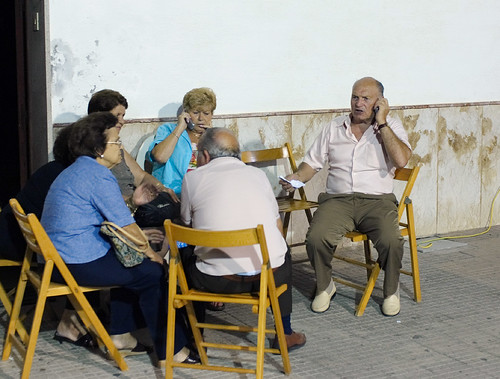No one can tell you what the lecture is… sorry for the silly Matrix reference. The question here is on the issue of property and the lecture. The questions I hope to address are Who owns the lecture? Who controls the lecture? Who owns the lecture notes? What can the audience do? Who owns the audiences’ notes?
Some early background: In November 2006 I wrote the post Do you hand out your handouts which was concerned with students demanding (not asking) to have handouts in advance. This is also part of a larger issue of the impact of becoming dependent on technology in teaching (see post Teaching with powerpoint).
What triggered these reflections was the news that University of Florida professor Michael Moulton was claiming the right to prevent his students from selling their lecture notes. His claim was based upon the concept that the students notes were actually derivative works from his own notes and therefore the lecturer could use copyright to prevent the students from selling their notes. This is the basic story read more details at Wired.
Standing and talking i.e. giving a lecture is not copyrightable per se, this is actually a good thing as most lectures tend to be the explanation of the works of many others (not all mentioned). A lecture on basic copyright law will include ideas and direct quotes from the law, courts and often other jurists. The nature of the lecture is to educate the audience on a certain issue and therefore cannot be only the ideas and opinions of the lecturer. This use of the ideas and texts of others is neither copyright infringement or plagiarism.
The lecture becomes copyrightable when it is a derivative work of the lecture notes. In other words a lecture given without notes is not copyrightable, nor is a lecture given from notes taken from the public domain. If the non-copyrightable lecture is filmed or recorded then the copyright goes to the person recording (the director).
The “right” of the lecturer to refuse the audience to record is actually not a question of copyright but more a question of labor law. For example, if I were to refuse to let my students record me the question would be one of my refusal to carry out my job as a lecturer. The ensuing discussion between my employer and me would be a re-negotiation of my contract to take into account the audiences’ desire to record my work. Many lecturers I have spoken to are not aware of this position and some react very strongly to being recorded while they work. The audience taking notes is a developed fair use but again the lecturer could theoretically refuse to talk if someone were holding a pen (as with a recording device) but it is doubtful that the academic employer would support this position.
What can the audience do with their notes or recordings? If we presume that the lecture is based upon the copyrightable notes of the lecturer (as opposed to an ad hoc talk or a folk dance following a traditional pattern i.e. uncopyrightable) then any kind of reproduction of the notes/recording would be a violation of the copyright of the lecturer. The audience can however sell their copies or make copies for their friends within the limits of fair use but this would not allow them to make several copies or post the notes/recording on the Internet.
Therefore the lecture is a collection of rights and it intersects with different legal areas. Beyond that it is also a specific situation based upon the traditions and expectations of the audience and lecturer. The lecturer seems to have more power since he/she has chosen the subject, scheduled the event and does all the talking but this is not necessarily the case. The lecture is a socially constructed affair which requires audience participation in specific forms (coming on time, sitting properly, silence, attention etc)
On top of all this comes the control via labor law and contracts. Wow, who said that giving a lecture was easy?




